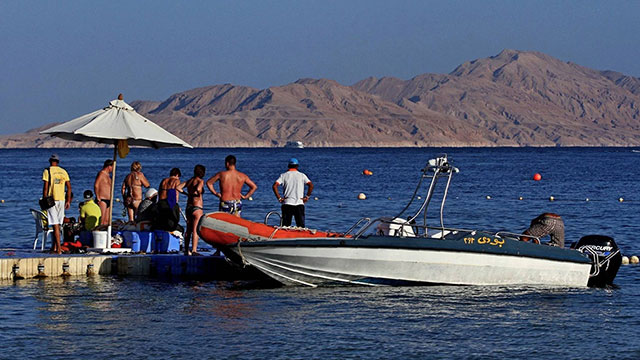
King Salman
צילום: AFP
Saudi Arabia's subtle hints
Op-ed: The kingdom's moves in the Straits of Tiran point to a policy of Iranian containment and an attempt to use the Levant and North Africa region as defensive back, and point to quiet, strategic relations without the need for normalization.
Take a good look at King Salman of Saudi Arabia: he's elderly, deep into his 80s, and his health is far from the best. He has difficulty speaking and walking, and those who have been in his presence report that his memory is failing him and that he gets disoriented frequently. His advisors will cancel meetings without explaination, and whenever he has to make a speech, someone else will read it out loud.
Nevertheless, we cooperated with him, and the big "surprise" that we got from the Saudis during their "historic" visit to Egypt was met with silence from Israel. We could have easily protested this transfer of the islands of Tiran and Sanafir at the mouth of the Gulf of Eilat.
Yet the Saudis aren't beholden to Israel. Their country is going through a volatile period due to Iranian subversion on the one hand, and ISIS terrorism on the other, all while the competition in the global gas market due to the Iranian nuclear deal is just beginning to ramp up.
If the monarchy can take these hits, what happened behind the scenes with Israel can be overcome just as quickly.
It is becoming clear that the project to build the political—security—economic bridge between Saudi Arabia and Egypt will be built with mutual cooperation. In Israel, we knew in advance what would happen and when: Saudi Arabia sent a message, and Israel sent a response. Defense Minister Moshe Ya'alon revealed that Israel made sure that the area would remain secure.
It isn't only King Salman who is making this promise, but also Crown Prince Hamed bin Nayef, and Deputy Crown Prince Prince Mohammad, the son of the current king.
This isn't a love story. Saudi Foreign Minister Adel Jubeir concluded the secret conduct with stark headlines: Saudi Arabia will be beholden to the Israel–Egypt peace treaty, and Saudi Arabia has no intentions of starting a war against Israel or to put armed forces on Tiran and Sanafir—overtures to secret coordination with Israel. However, in the same breath, he said that Saudi Arabia has doesn't intend to sign any peace treaty with Israel.
I believe every word he said. The Saudis believe that the peace agreements between Israel and Egypt and between Israel and Jordan enable a stable area from which to work. The new trend in the region is based on strategic cooperation without normalization, and without negating the hostility of the Arab street towards Israel. To this end, they will continue to publicly call Israel the "Zionist threat," and will continue to curse Netanyahu.
These mutual interests between Israel, Egypt, Jordan, and Saudi Arabia form a front against the Iranians. Saudi Arabia and Israel see eye to eye regarding the Iranian threat and also regarding the potential dangers which Iranian puppets such as Hamas and Hezbollah present.
And yet, in the eyes of the Israelis, Saudi Arabia is seen as a fat and sluggish sheikh which is stretched out on an oil well, and which pays others to do his work for him.
The tentacles of the Saudi octopus and their suitcases full of dollars can be seen everywhere from Cairo to Jordan, from Morocco to Turkey, and anyone else who decides to join the Sunni camp.
Look at the pace with which the Saudis work—in four days the Saudis "bought" two islands in the red sea, the deputy crown prince landed in Jordan, and immediately after, the Jordanians shut down the Muslim Brotherhood offices in that country. Salman went to Istanbul and tried to help the reconciliation between Erdoğan and Sisi. It hasn't succeeded, but the king is patient and Erdoğan has problems. And we've come full circle—that which Sisi is asking of Erdoğan is exactly what the Turks want from Israel.
The most important thing in Saudi eyes is to stabilize Sisi in Egypt. The next objective will be for Saudi Arabia to create some sort of reconciliation between Hamas and Fatah. If it succeeds, they will come to the Israelis with an Arab peace initiative to hear what Israel will suggest. If Israel stumbles, anything can happen in the Red Sea.











